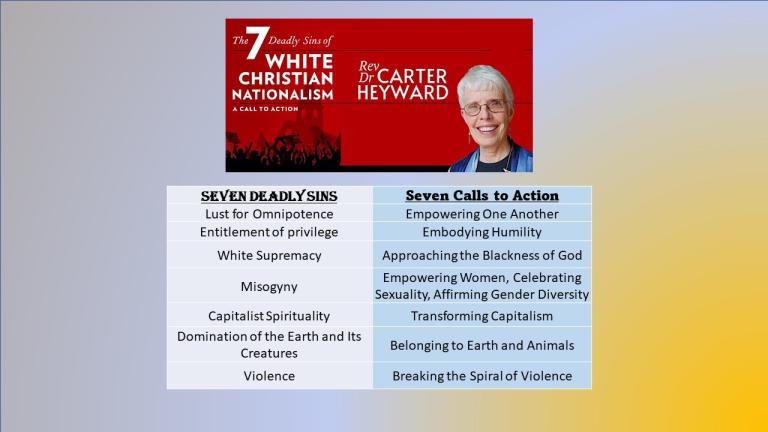Here’s why you can – and should – claim your faith and identity as a Progressive Christian with confidence. And then act on it.

Are You Shy About Being a Progressive Christian?
I teach preaching and worship at a Progressive Christian seminary. Many of our students come to us from right-wing fundamentalist Christian upbringings that haunt them even years after leaving those churches behind. These students sometimes struggle with claiming their identity as a Progressive Christian because of the ways in which their family members, friends, and previous congregations mischaracterize this approach to Christianity. Others who have been in mainline Protestant denominations for decades sometimes shy away from being public about their Progressive Christian values because of the pushback they receive from politically conservative congregants.
But we’re at an inflection point in American history where the choices we make about the kind of Christian we’re going to be will have enormous ramifications for this country and the future of our democracy. The alternatives of merely “quiet quitting” fundamentalist Christianity or staying in the shadows because you cringe at being called a “snowflake” or “libtard” aren’t going to cut it anymore.
For far too long, Progressive Christians have stood on the sidelines while right-wing fundamentalists co-opted our religion. Being bashful about your identity as a Progressive Christian is no longer an option. We’re called to step into the work of transformation and spiritual renewal with urgency and unwavering commitment to the ethics of Jesus.
So if you are a Progressive Christian, it’s time to own that identity – and act on it – with confidence.
It’s About the Bible
Being a Progressive Christian means that you love the Bible. AND you recognize that there is no such thing as a “literal” interpretation of Scripture. We want to understand what the text meant to its original author, readers, and context. And we’re interested in hearing interpretations from historically underrepresented communities, such as women, people with disabilities, African Americans, and folks who are LGBTQIA.
Here’s the thing about biblical literalists. They tend to cherry-pick which verses to interpret literally and which ones to gloss over or ignore completely.
For example, they cite the “clobber passages” in the Bible to condemn people who are gay without taking into account the historical time and context in which these texts were originally written. (The passages include: Genesis 19, Leviticus 18:22, Leviticus 20:13, Romans 1, 1 Corinthians 6:9-10, and 1 Timothy 1:9-10.) Yet they take a wide berth around Jesus’s teaching about divorce (Matthew 19:3-12, Mark 10:2-12) and seem to be fine with serial marriages.
Progressive Christians don’t take the teaching about divorce literally either. But it’s not because we’re hypocrites. It’s because we recognize that condemning divorce in Jesus’s time was about protecting vulnerable women in a patriarchal society from getting ditched by men and left in poverty with no safety net.
So, if you’re a Progressive Christian, you’re willing to grapple with the Bible’s tough passages and hold yourself and your community accountable to its ethical teachings. You give Scripture just as much authority as your fundamentalist counterparts – but with your critical thinking skills intact.
It’s About Theology
Being a Progressive Christian means that you love God. AND you have a very different understanding of who God is and what God does than your fundamentalist siblings. For example, the interpretive method biblical literalists use has the agenda of strict control over its adherents so that any questioning, doubt, or scrutiny is equated with unfaithfulness and disobedience. This interpretive method is based on a distorted view of God as authoritarian, patriarchal, and exclusive.
Progressive Christians, in contrast, are gloriously messy and complicated when it comes to interpreting Scripture. There’s no one way to interpret the Bible if you’re a Progressive Christian. In fact, there are a multitude of lenses that we bring when we’re trying to understand Scripture.
This is because we see God as creative, gracious, forgiving, and yet protective of those most vulnerable.
As my colleagues, Dr. Jerry Sumney, Dr. Emily Askew, and I write in our forthcoming book, Introduction to Preaching: Scripture, Theology, and Sermon Preparation, this kind of theological orientation allows us to embrace what we call “perspective-explicit interpretations.” These are points of view that recognize, highlight, and take advantage of the observations and reactions that come when readers listen from their various social locations, identities, and ideologies.
Reading the Bible from a particular perspective has significant benefits. First, it helps us understand the Bible more clearly. Second, reading from varying perspectives helps us see how each text is shaped by the author’s unconscious and sometimes problematic presuppositions (like assuming that God is a human male). Third, it allows previously silenced or ignored voices to give us insights into God’s Word.
So, if you’re a Progressive Christian, you rejoice in the panoply of perspectives about God and the Bible, such as Latiné, Asian, post-colonial, and ecological lenses. You celebrate that each of them will expand the breadth and depth of your love for Scripture as well as your love for God!
It’s About Not Being a Christofascist
“Christofascist” is a strong word, I know. But it’s the only apt descriptor of what fundamentalist Christianity in America has become. In her book, The Seven Deadly Sins of White Christian Nationalism, Carter Heyward explains that Christofascism is “a seductive form of authoritarianism taking shape among us in the guise of Christian faith and all-American values, especially the value of liberty, or freedom, even at the expense of the common good” (xii).
First coined by the German theologian Dorothee Soelle, Christofascism is the unholy trinity of Christianity, capitalism, and Republican political power. As early as the 1980s, Soelle recognized the beginnings of theocracy made in the image of rich, white Christian men – exactly as she saw in fascist Germany in the 1930s.
What are the seven deadly sins of Christofascism?
Carter says they are: 1) the lust for omnipotence; 2) entitlement to privilege; 3) white supremacy; 4) misogyny; 5) capitalist spirituality; 6) domination of earth and its creatures; and 7) violence.
If you are a Progressive Christian, these things make you queasy. Or they make your blood boil. Or they make you want to go out and join a protest, write a letter to the editor, or preach a sermon encouraging people to vote in a way that reflects their Progressive Christian values.
However, if you read this list and get defensive, or worse, a tingle of excitement, you might be under the sway of Christofascism.
One of the things that is helpful about Heyward’s book is that she gives us seven corresponding calls to action to counter the seven deadly sins of White Christian Nationalism.

What are the calls to action for a Progressive Christian?
According to Heyward, the calls to action are: 1) empowering one another; 2) embodying humility; 3) approaching the blackness of God; 4) empowering women, celebrating sexuality, affirming gender diversity; 5) transforming capitalism; 6) belonging to earth and animals; and 7) breaking the spiral of violence.
If you are a Progressive Christian, these things make your heart sing. Or they make your mind curious. Or they make you want to go out and get some anti-racism training, or encourage your congregation to affirm transgender and queer folks, or preach a sermon about protecting God’s Creation.
However, if you read this list and it makes you feel angry, or worse, like you want to punch someone or pull out a gun and start shooting, or stage an insurrection, you might be under the sway of Christofascism.
It’s About Justice
Progressive Christians share a commitment to helping each other and society understand the complexities and intersectionalities of different forms of oppression. We share a common orientation to values such as the ordination of women, LGBTQIA+ rights, racial and ethnic equity, attention to the marginalized, and care for God’s Creation. Why are these important to a Progressive Christian? Because we care about justice.
Justice in Hebrew is mishpat, which is about fairness and equity. In passages like Micah 6:8, God is telling those with power that they must share and follow God’s law so that everyone can have what they need to live, not just the rich and powerful who hoard their wealth for their own exclusive use.
God has told you, O mortal, what is good;
and what does the Lord require of you
but to do justice, and to love kindness,
and to walk humbly with your God? (Micah 6:8)
It’s About Being a Decent Human Being
Kindness in Hebrew is chesed which is about being merciful. Some people sneer and call this being “woke.” But respect, caring, inclusion, making an even playing field – those are not part of some “liberal snowflake agenda.” That’s called being a decent human being and creating a better society, the kind of society that God wants for us.
Walking humbly in Micah 6:8 is yalak sana and it is in direct contrast with the prideful strides of those who are powerful, arrogant, merciless, and ruthless. A Progressive Christian will strive to humbly orient themselves to an ethic of care that is open to other people’s pain – and especially to confronting the structural sins that lead to or exacerbate that pain.
It’s About Wanting the Planet and Human Beings to Survive
Unlike fundamentalist Christians, Progressive Christians do not see science as an enemy of faith. Nor do they see other faiths as an enemy of Christianity. Instead, Progressive Christians look to build bridges of respect, understanding, and common values in order to address the most pressing problems of our time.

Whether it’s the public health crisis of a pandemic, the global climate crisis, or a local issue such as police brutality, Progressive Christians reach out to others who share their commitment to the common good. They do this because they follow the teachings of Jesus, the Hebrew prophets, and a core biblical value summed up by the two primary commandments:
Love God and love your neighbor.
If you’re a Progressive Christian, you get jazzed about the idea of a healthy, livable planet that we share with the plants and animals God has nurtured into existence over millions of years. You take your cue from Jesus to care for “the least of these” so that everyone has what they need to survive and flourish – not just the straight, white, wealthy Christians who live in America. And if you’re a Progressive Christian, you’re committed to the values of truth, nonviolence, equity, power-with rather than power-over, and healing and wholeness in mind, body, spirit, and society.
This isn’t to say that you’re a perfect human being. But it does mean that you strive for this kind of spiritual perfection. These values are important to you because you’re a Progressive Christian – you’re progressing toward the vision of the Beloved Community, the Realm of God proclaimed by and embodied within the teachings, life, death, and resurrection of Jesus.
It’s About Time You Claim Your Identity as a Progressive Christian – and Act On It
Heyward notes that many good, upstanding white Christians have not wished to be associated with white supremacy or male gender domination. Yet, they “have refused to join, much less lead, publicly in social struggles against injustice throughout much of American history,” (15). She likens this to “gazing out the window,” an experience Elie Wiesel described when good upstanding Germans simply watched as Jews were loaded onto boxcars and carried to the death camps.
If you’re a Progressive Christian, you’re not okay with just gazing out the window. You know that it’s time to name and claim who you are as a Progressive Christian. And then act on it. This goes for clergy and congregations alike. The stakes are too high to simply gaze out the window and watch as Christofascism destroys all that is sacred, including the planet itself.
It’s more than just okay to be a Progressive Christian. It is essential.
Join me for a conversation with Carter Heyward on Oct. 25th, co-hosted by the Clergy Emergency League and the Wisconsin Council of Churches!
Click here to register: https://www.wichurches.org/2022/09/carter-heyward/
Read also:
Preaching Across Divides: Purple Zone Strategies for Pulpit and Public Square
Pentecost & the Divine Purpose of Diversity: Genesis 11, Acts 2
The Politics of Faith – The Bible, Government, and Public Policy: Book Review

The Rev. Dr. Leah D. Schade is the Associate Professor of Preaching and Worship at Lexington Theological Seminary in Kentucky and ordained in the ELCA. Dr. Schade does not speak for LTS or the ELCA; her opinions are her own. She is the author of Preaching in the Purple Zone: Ministry in the Red-Blue Divide (Rowman & Littlefield, 2019) and Creation-Crisis Preaching: Ecology, Theology, and the Pulpit (Chalice Press, 2015). She is the co-editor of Rooted and Rising: Voices of Courage in a Time of Climate Crisis (Rowman & Littlefield, 2019) and co-wrote Apocalypse When?: A Guide to Interpreting and Preaching Apocalyptic Texts (Wipf & Stock, 2020). Her book, Introduction to Preaching: Scripture, Theology, and Sermon Preparation, co-written with Jerry L. Sumney and Emily Askew, will be released by Rowman & Littlefield in March 2023.













